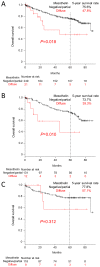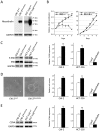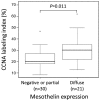Diffuse mesothelin expression leads to worse prognosis through enhanced cellular proliferation in colorectal cancer
- PMID: 32194667
- PMCID: PMC7039175
- DOI: 10.3892/ol.2020.11290
Diffuse mesothelin expression leads to worse prognosis through enhanced cellular proliferation in colorectal cancer
Abstract
Mesothelin (MSLN) is a glycophosphatidylinositol (GPI)-linked cell surface protein that is highly expressed in several types of malignant tumor, including malignant pleural mesothelioma, ovarian cancer and pancreatic adenocarcinoma. Recently, a comprehensive immunohistochemical study using MN-1 monoclonal antibody identified a significant number of colorectal tumors in which MSLN was expressed. However, the clinicopathological profiles and survival of patients with MSLN-positive colorectal cancer have not been fully analyzed. In the current study, the expression of MSLN in 270 primary and 44 metastatic colorectal tumors was immunohistochemically analyzed to determine the clinical usefulness of MSLN immunohistochemistry and to identify potential candidates for future anti-MSLN therapy. In vitro experiments using colon cancer cell lines were performed to investigate the biological significance of MSLN expression in tumors. The results of univariate analyses identified a significant correlation between MSLN expression and females (P=0.0042). Furthermore, an inverse correlation between MSLN expression and solid/sheet-like proliferation (P=0.014) was also revealed. Additionally, overall survival was significantly shorter in patients with diffuse luminal/membranous expression of MSLN (P=0.018). Multivariable Cox hazards regression analysis revealed diffuse MSLN expression (hazard ratio, 2.26; 95% confidence interval, 1.04-4.91; P=0.039) as a potential risk factor. When comparing primary CRCs and the metastasis of each, a weakly positive correlation was identified for MSLN positivity (% positive cells; R=0.484; P<0.0001). The in vitro experiments revealed a positive role for MSLN in colon cancer cell proliferation. Thus, MSLN immunohistochemistry may be useful in the prognostication of patients with CRC. The results demonstrated that significant numbers of patients with MSLN-positive CRC exhibiting metastasis could be targeted by anti-MSLN therapies.
Keywords: cellular proliferation; colorectal cancer; immunohistochemistry; mesothelin; prognosis.
Copyright: © Inoue et al.
Figures






References
LinkOut - more resources
Full Text Sources
Research Materials
Miscellaneous
